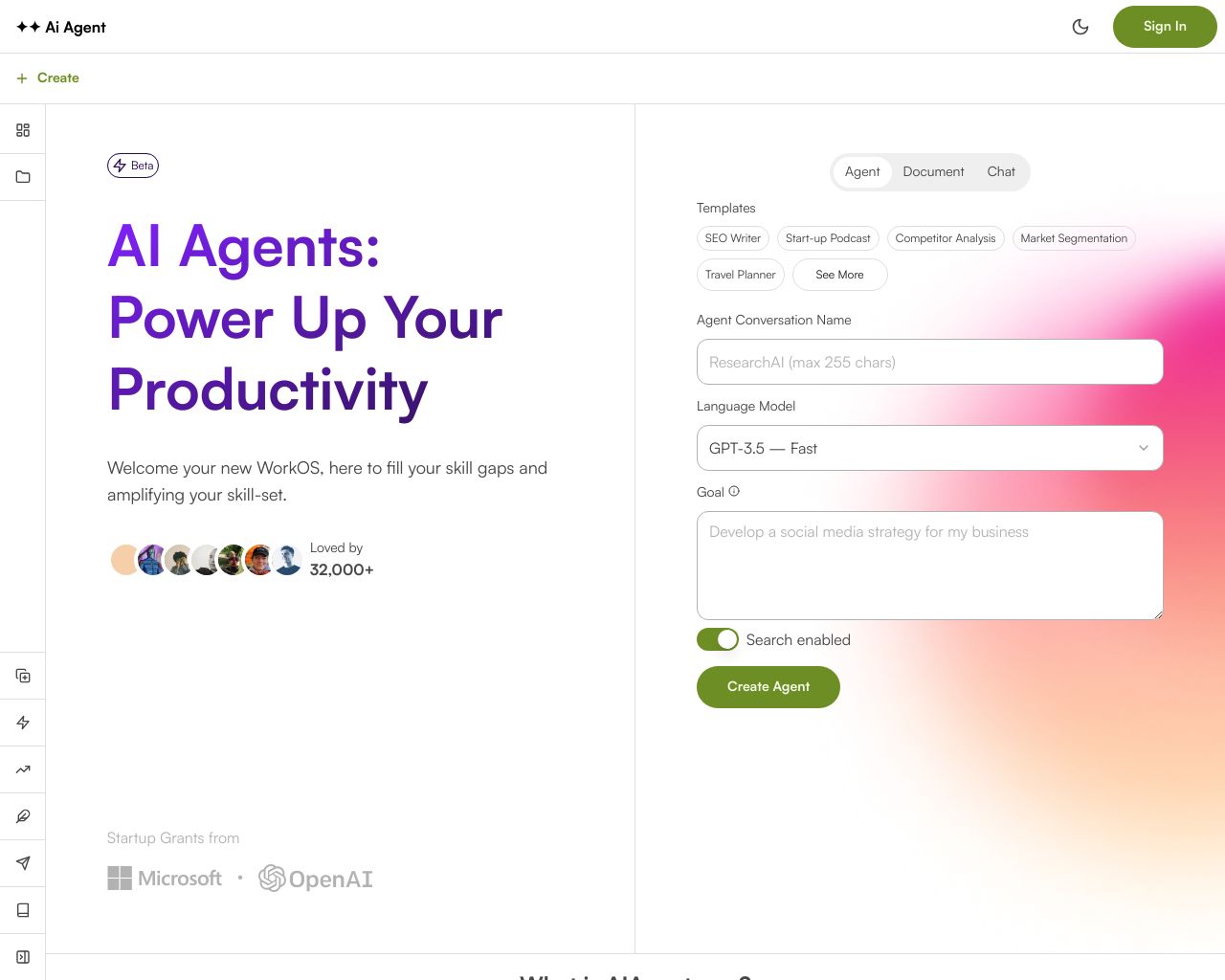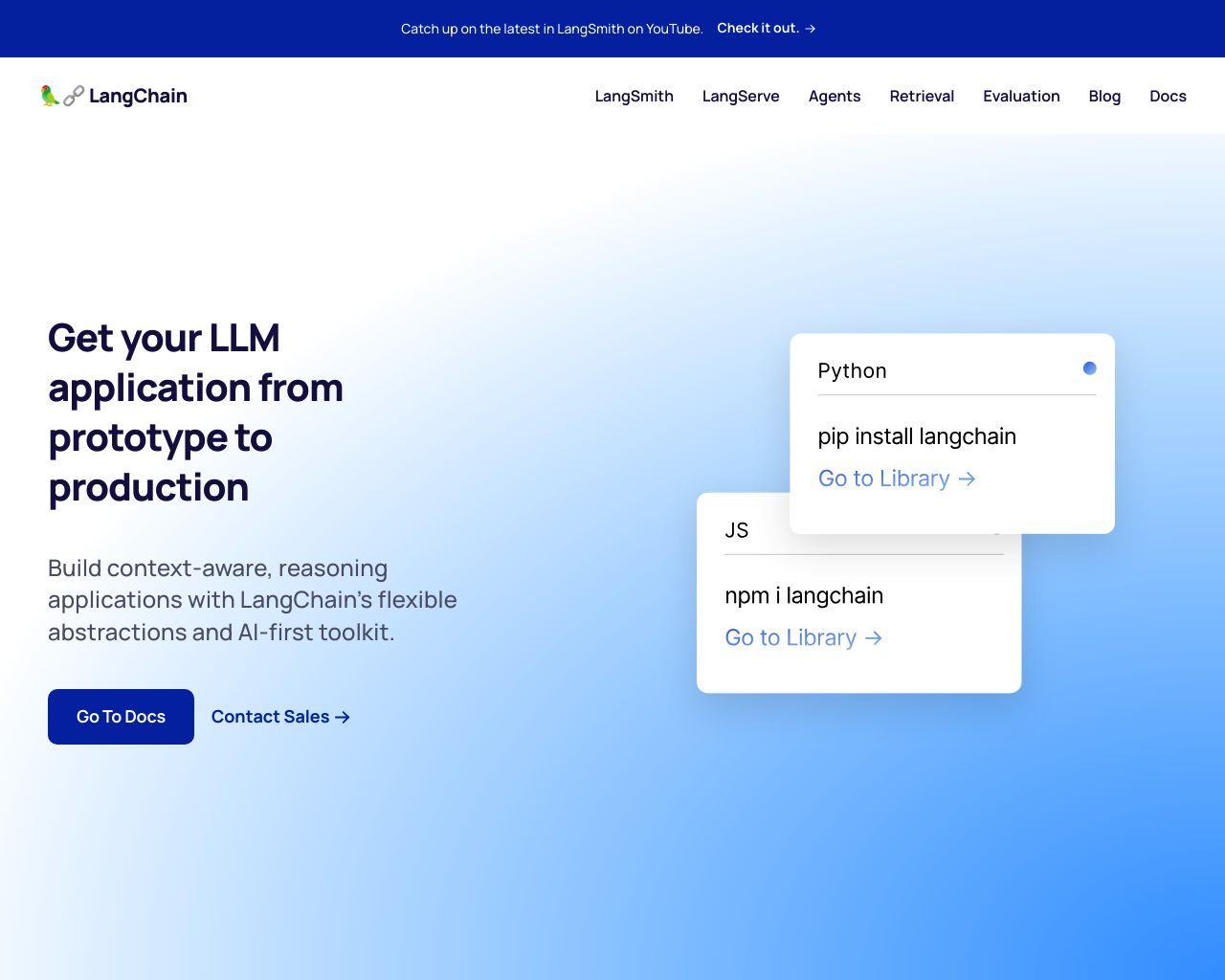AI technologies continue to reshape industries and redefine possibilities, making the choice of AI development platforms crucial for businesses and developers. This comparison explores AI Agent, LangChain, and SmythOS, three distinct approaches to harnessing AI power. AI Agent offers a no-code solution for creating AI assistants, appealing to non-technical users. LangChain provides an open-source framework for developers to build sophisticated language model applications. SmythOS emerges as a comprehensive platform, combining user-friendly interfaces with advanced features and enterprise-grade security. We’ll examine how each platform addresses key concerns like ease of use, customization, security, and scalability, helping you determine the best fit for your AI development needs.
AI Agent Overview
AI Agent empowers users to create and deploy intelligent AI assistants without coding expertise. The platform’s no-code approach opens up advanced AI capabilities to a broad audience, from developers to business professionals.
At its core, AI Agent offers a versatile system for building custom AI agents that can perform a wide range of tasks autonomously. Users can connect these agents to over 6,000 apps, enabling automation across email, file management, data analysis, and more. This extensive integration ecosystem positions AI Agent as a powerful tool for streamlining workflows and boosting productivity across various business functions.
AI Agent empowers users to create and deploy intelligent AI assistants without coding expertise. The platform’s no-code approach opens up advanced AI capabilities to a broad audience, from developers to business professionals.
The platform shines in its user-friendly design, featuring an upcoming visual workflow builder and pre-built templates for common use cases like SEO writing, social media management, and travel planning. These tools allow users to rapidly deploy AI solutions tailored to their specific needs. Real-time task execution and customizable agent behaviors provide flexibility and control over AI interactions.
AI Agent’s strengths lie in its accessibility and broad integration capabilities. However, the platform may face challenges in highly specialized or technical deployments that require deep customization. While it excels in automating routine tasks and enhancing productivity, users seeking advanced AI research capabilities or complex multi-agent systems may need to look elsewhere.
Scalability stands out as a key feature of AI Agent, with support for running multiple AI agents simultaneously. This makes it well-suited for businesses looking to implement AI solutions at scale. The platform also offers different subscription tiers, including free and premium options, allowing users to choose a plan that fits their needs and budget.

AI Agent positions itself as a bridge between advanced AI technology and practical business applications. By simplifying the creation and deployment of AI agents, it aims to democratize access to AI capabilities. This approach resonates particularly well with businesses and individuals looking to leverage AI for improved efficiency and innovation without the need for extensive technical resources or expertise.
LangChain Overview
LangChain revolutionizes AI application development with its open-source framework. Designed for building applications powered by large language models (LLMs), LangChain simplifies every stage of the LLM application lifecycle.
LangChain revolutionizes AI application development with its open-source framework. Designed for building applications powered by large language models (LLMs), LangChain simplifies every stage of the LLM application lifecycle.
The LangChain framework offers a comprehensive suite of tools for developing, productionizing, and deploying LLM-based applications. It provides open-source building blocks, third-party integrations, and specialized components like LangGraph for creating stateful agents with streaming and human-in-the-loop support.

LangChain’s ecosystem includes powerful tools such as LangSmith for inspecting, monitoring, and evaluating chains, enabling continuous optimization. LangGraph Cloud transforms LangGraph applications into production-ready APIs and assistants. The framework also incorporates several libraries like langchain-core for base abstractions and langchain-community for third-party integrations.
LangChain’s ecosystem includes powerful tools such as LangSmith for inspecting, monitoring, and evaluating chains, enabling continuous optimization.
A standout feature is the LangChain Expression Language (LCEL), which offers a declarative way to chain components. LCEL provides first-class streaming support, async capabilities, optimized parallel execution, and seamless tracing with LangSmith. The Runnable interface standardizes the creation of custom chains, supporting methods like stream, invoke, and batch.
LangChain excels in providing components for various LLM-related tasks. These include chat models, prompt templates, output parsers, document loaders, text splitters, embedding models, vector stores, and tools for building sophisticated AI applications. The platform emphasizes streaming capabilities to address latency issues and offers techniques for structured output and advanced retrieval strategies.
While LangChain offers a robust set of tools for LLM application development, it may present a steeper learning curve for non-technical users. The platform’s focus on flexibility and customization could potentially overwhelm beginners seeking simpler, out-of-the-box solutions. Additionally, as an open-source framework, users might need to rely more on community support and documentation for troubleshooting and best practices.
Feature Comparison
AI Agent and LangChain take different approaches to AI development. AI Agent focuses on simplicity and accessibility, offering a no-code platform for creating AI assistants without programming expertise. Its visual workflow builder and pre-built templates enable rapid deployment of AI solutions for common business tasks. AI Agent excels in user-friendliness and broad integration capabilities, connecting to over 6,000 apps for extensive automation possibilities.
LangChain, as an open-source framework, provides more flexibility and customization for developers building LLM-powered applications. It offers comprehensive tools like LangGraph for creating stateful agents, LangSmith for monitoring and evaluation, and specialized components for tasks such as document loading and embedding. LangChain’s Expression Language (LCEL) allows for declarative component chaining with advanced features like streaming and async support. While powerful, LangChain’s approach may present a steeper learning curve compared to AI Agent’s more intuitive interface.
In terms of security, AI Agent’s documentation does not explicitly mention features like data encryption or constrained alignment, which are crucial for enterprise deployments. LangChain, being an open-source framework, leaves security implementation largely to the developers, potentially requiring additional effort to ensure robust protection of sensitive data and alignment with organizational goals. This gap in core security components could be a significant consideration for businesses handling sensitive information or requiring strict compliance measures.
Feature Comparison Table
| AI Agent | LangChain | SmythOS | |
|---|---|---|---|
| CORE FEATURES | |||
| Visual Builder | ✅ | ❌ | ✅ |
| No-Code Options | ✅ | ❌ | ✅ |
| Audit Logs for Analytics | ❌ | ✅ | ✅ |
| Agent Work Scheduler | ❌ | ❌ | ✅ |
| SECURITY | |||
| Constrained Alignment | ❌ | ❌ | ✅ |
| IP Control | ❌ | ❌ | ✅ |
| COMPONENTS | |||
| Foundation AIs | ❌ | ✅ | ✅ |
| Zapier APIs | ✅ | ❌ | ✅ |
| Data Lakes | ❌ | ❌ | ✅ |
| DEPLOYMENT OPTIONS (EMBODIMENTS) | |||
| Deploy as Webhook | ✅ | ❌ | ✅ |
| Staging Domains | ❌ | ❌ | ✅ |
| Production Domains | ❌ | ❌ | ✅ |
| Deploy as Scheduled Agent | ❌ | ❌ | ✅ |
| DATA LAKE SUPPORT | |||
| Hosted Vector Database | ❌ | ❌ | ✅ |
| Sitemap Crawler | ❌ | ❌ | ✅ |
| YouTube Transcript Crawler | ❌ | ❌ | ✅ |
| URL Crawler | ✅ | ❌ | ✅ |
| Word File Support | ✅ | ❌ | ✅ |
Best Alternative to AI Agent and LangChain
SmythOS stands out as the superior alternative to AI Agent and LangChain for agentic AI automation. Our platform combines powerful capabilities with unmatched ease of use, enabling rapid development and deployment of sophisticated AI agents. SmythOS’s visual drag-and-drop interface eliminates coding requirements, allowing users of all technical backgrounds to build complex AI workflows effortlessly.
We offer seamless integration with thousands of APIs and AI models, providing unparalleled flexibility. Our hosted solution handles scalability and security concerns, letting users focus on innovation. With SmythOS, you can deploy agents as APIs, chatbots, scheduled tasks, and more — all from a single unified platform. Advanced features like multi-agent orchestration, hosted vector databases, and fine-grained security controls set SmythOS apart.
While AI Agent and LangChain have strengths, they lack SmythOS’s comprehensive feature set and intuitive usability. Our platform empowers users to harness the full potential of AI agents faster and more effectively than ever before. For businesses and developers seeking to accelerate AI adoption and unlock new possibilities, SmythOS delivers the ideal combination of power, flexibility, and accessibility.
SmythOS stands out as the superior alternative to AI Agent and LangChain for agentic AI automation… combining powerful capabilities with unmatched ease of use, enabling rapid development and deployment of sophisticated AI agents.
Conclusion
AI Agent, LangChain, and SmythOS each offer unique approaches to AI development and deployment. AI Agent excels in user-friendliness and broad integration capabilities, making it accessible to non-technical users. LangChain provides a flexible, open-source framework for developers to build sophisticated LLM applications. However, SmythOS emerges as the superior option, combining ease of use with powerful features and enterprise-grade security.
SmythOS stands out with its intuitive drag-and-drop interface, extensive integration ecosystem, and versatile deployment options. Unlike AI Agent and LangChain, SmythOS offers robust security features like data encryption and constrained alignment, crucial for enterprise deployments. Its support for multimodal interactions, problem-solving capabilities, and scalable embodiments such as APIs, chatbots, and scheduled agents empowers users to create sophisticated AI solutions without extensive coding knowledge.
While AI Agent and LangChain have their strengths, SmythOS provides a more comprehensive solution for businesses and developers looking to harness the full potential of AI. Its ability to support multi-agent collaboration, human-AI interaction, and advanced features like data lakes and hosted vector databases sets it apart from the competition. For those seeking to revolutionize their workflows and drive innovation through AI, SmythOS offers the most compelling package.
Explore SmythOS’s diverse range of AI-powered agent templates to jumpstart your AI journey or dive into our comprehensive documentation to unlock the platform’s full potential. With SmythOS, you can create once and deploy AI agents anywhere, transforming your business processes and staying ahead in the AI-driven future.